Worldwide
Eddie Hearn Talks Past, Present and Future Plans
Published
on
By
James Lupton
Eddie Hearn is a 44 year old boxing and sports entertainment promoter from England, whose profile has exploded in the last five years, within Britain and well beyond. Boxing journalist James Lupton sat down for a lengthy chat with the all-star boxing fixture. Enjoy the insights from the charismatic deal-maker, who is 44 years old, and expanding his brand breadth all the time.
Question from James Lupton: First of all, you started off in golf, to poker, then to boxing. What was it about boxing that made you fall in love with it?
Answer From Eddie Hearn: I fell in love with boxing when I was probably eight or nine years old, really. A lot of people say boxing is in your blood, but I think if it’s in your blood, you’re born with it through generations, but wasn’t really in my dad’s blood either. He just found boxing.
He was a chartered accountant who stumbled into Snooker, met Steve Davis, then took over the sport and managed basically every big name player there was. And then randomly just thought I’d quite like to do a fight. And his first fight was Frank Bruno against Joe Bugner, at White Hart Lane (1997), didn’t know what he was doing.
Just approached the fighters without going for any management or promoters, drove everyone mad and got it off the ground.
And then from there, I went on and had a really successful career.

Hearn arrived on collective radars in US when he hooked up with DAZN.
I was nine years old then, and over the next probably five or six years, spent that time travelling with him and being around people like Chris Eubank and Nas and Lennox Lewis and Bruno and even lesser-named fights really that become quite heroic to me, like Jim McDonnell and Francis Ampofo and a lot of the Matchroom fighters.
Really from the age of probably eight or nine to 15, I was obsessed with boxing, studied it – I had a couple of gym bouts myself at an amateur club. I just studied British boxing yearbooks, records, opponents styles, everything. And then got to 15, 16 and started going out and enjoying myself.
And then, my dad lost a little bit of heart with boxing, really. I think it’s a very frustrating business, and it can make you miserable, it can make you angry, it can give you a hump. And I think he just thought, ‘I’m going to go and do some darts. It’s a lot easier’.
Hearn Family Moves From Boxing To Darts
Eddie Hearn: So once he moved away from boxing, I never really… And even when I was studying boxing, I never thought, ‘I want to be a promoter. I want to do what my dad does’. The business of Matchroom was always a lot bigger than just boxing, but it was a big part of it.
And when I left college, I didn’t really want to work for him because everyone just presumed I would work for him. So I went into athlete representation, I was a sports agent. I represented a lot of athletes and then particularly golfers on the PGA tour, European tour as well.
“Travelled around America with them, and then started to come back into the matchroom business. And then with the explosion of poker. And we became the biggest producer of televised poker events. So all the poker you used to see on TV was us.
And then, as you know, met Audley Harrison and we were just doing prize fire at the time. Sky had four promoters, Matchroom, Frank Warren, Frank Maloney, and Ricky Hatton and we didn’t have any fighters!
We were just using them really for my dad’s old mates to give them a couple of slots on the shows. They were terrible, the shows, awful. Actually, every show that was on was awful.
And I came back with Audley and into Prizefighter and just felt that there was an opportunity to get that exclusive deal with Sky because I thought everything was so poor.
And I just felt that boxing… Now, I remembered growing up going to the Eubank shows or the Nas shows, and I just felt like, where on Earth is boxing gone? We’re sitting here in a leisure center in Wigan, no disrespect to Wigan. And it’s not like this sport doesn’t have potential.
“It’s not like this sport is not great. Just no one’s trying. And the rest is history,” said Eddie Hearn.
Q) You mentioned there, he was about nine years old when your dad promoted his first fight. It might have been a little bit earlier than that. When he was on the phone to the likes of Don King and Bob Arum, how aware was Eddie Hearn at that time of what he was doing with those guys?
A) “Well, I wasn’t aware of who they were, but I was aware of the voices because at home we had a mainline and answer phone. And my mum always made sure that every business call, unless it was someone really important and very few people had the houseline, but they would phone the answer phone and it would say, “Please leave your message after a beat.”
And I would hear the voices: it could be Bob Arum, it could be Don King, it could be Pepe Forbes, one of my dad’s old matchmakers who would call every night, Don Majeski, people like this. And those voices, I’d hear them every night five or six times and my dad would choose which one to pick up as they left the message. It was most of them.
So as a kid, he was very good because when he was around, which wasn’t a great deal, but when he was around, the first thing he would do is go and give me an hour in the garden playing cricket or football, but then he would go into study and work on boxing.
I would sit in the study and I would just listen and muck around, not consciously listening, just subconsciously sitting there.I remember a lot of arguments. He’s a completely different person now than he was when he worked in boxing. He had a terrible temper when he was in boxing because it’s just what he does to you.
But he grew up, the first thing he did was pissed off Mickey Duff, and Jarvis Astaire because of the Frank Bruno fight, and then ended up becoming rivals with Warren and Arum and King and all those that lot.”
Q) For yourself, Eddie Hearn, very successful within boxing in the social media era, nobody really shows the negatives or the failures. What’s been your biggest failure and what did you learn from it?
A) “I don’t know, failure. I don’t feel there’s been many failures, but I feel like there’s been a lot of dark times. It just comes mainly through bad luck more than anything.
Boxing is very unforgiving as a sport and and unforgiving as a business where you can be so deep into a show and then you just get the call: it could be an injury, it could be someone stolen a fighter, it could be a drugs test, and you’re two or three weeks out.
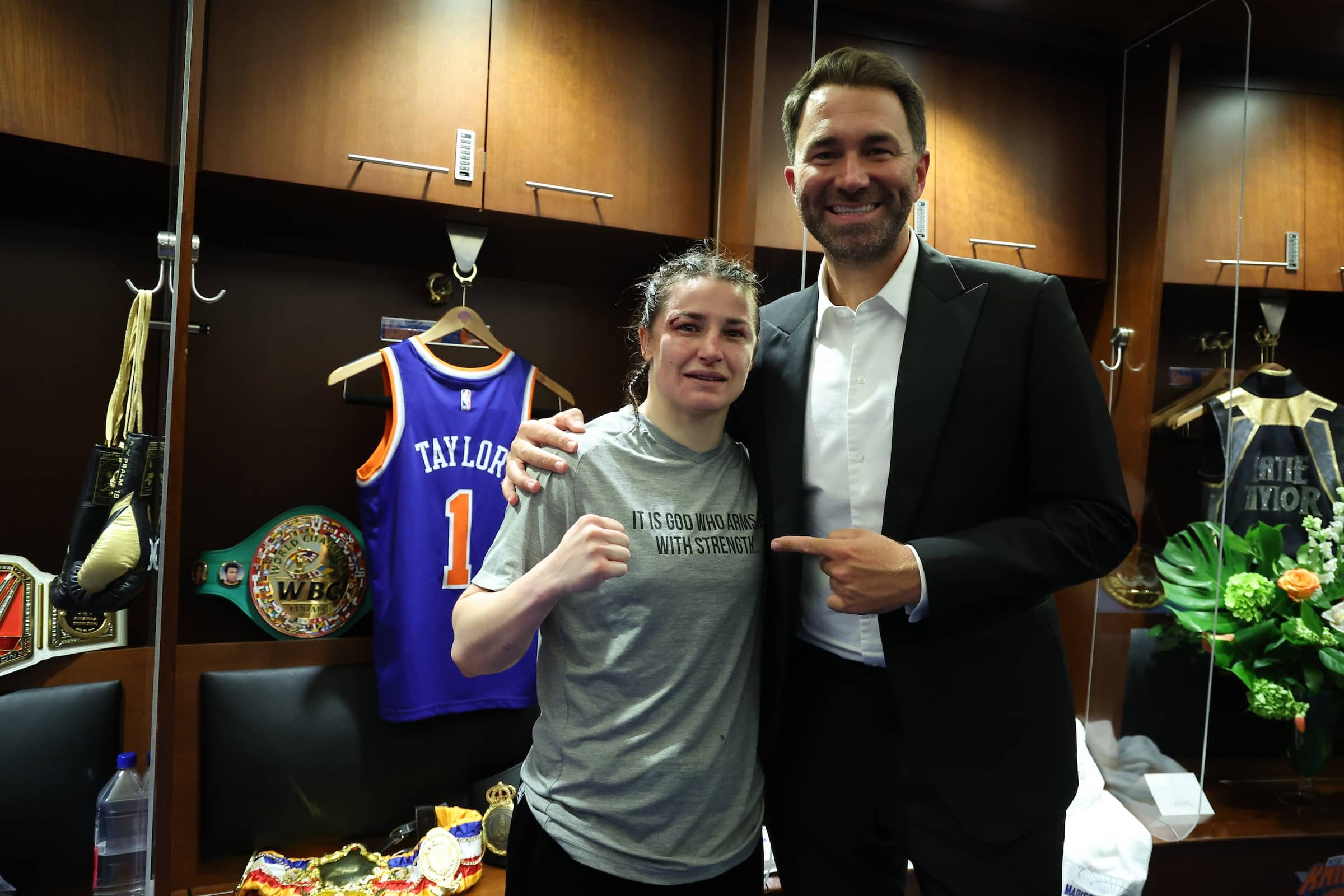
April 30, 2022–Katie Taylor poses with Eddie Hearn after her victory over Amanda Serrano at Madison Square Garden. Eddie promotes Katie’s fight on Saturday, Nov. 25, a rematch vs. Chantelle Cameron. Photo by Ed Mulholland/Matchroom.
You’ve got a sold-out venue, you’re hundreds of thousands of pounds deep in costs, and you’ve got to try and resurrect it. I think that it sounds a bit cheesy, but there’s nothing that makes me happier than delivering a good show.
And sometimes in the event of a pull-out, you have to make a decision. Do you go ahead with an average show or do you just can it? And I think I’ve only canned probably one show in about 12 years because I hate doing it because all these guys, they only get paid when they fight. I don’t think there’s been many failures. I think all the moves have been…
“Well, I think maybe when we went into America, we had a decision to go in quietly or all guns blazing, and I chose the latter. But you can’t really apologise for being you. I think I’ve chilled out over the years. Definitely still fiery, but not nowhere near as fiery as I used to be, and definitely more diplomatic now.
And maybe when you talk about failures, I guess you could talk about AJ against Wilder or AJ against Fury not happening, but we’ve still got time. And that certainly wasn’t my fault or our fault. But probably collectively, there was ego and errors made on both sides to make fights like that.”
Q) You get a lot of stick, Eddie Hearn. Whenever you come on big screen, you get your boos, and you get in the ring, you get your boos from the crowd. Have you ever received an insult that’s made you proud?
Eddie Hearn: “Proud? I guess everything. Do you know what? You can sit there and say, It doesn’t bother me. I don’t care. I’ve got thick skin. And I’ve got really thick skin like you have to. But it’s never nice to get loads of stick.
And sometimes you look at some of these accounts on Twitter, and every now and again, one will pop up that just is non-stop. And I sometimes go on their tweets and I read through them and it’s like the whole day is about me or my family or the business. And it’s like, first thing you think, just tell me who it is.
But secondly, you think there’s an agenda out there. I don’t believe that that is some random fight fan, in a nine to five or whatever that just sits there all day. That’s part of the system, really, that’s out to try and… When I came into the sport, and it’s quite funny because sometimes I look at Ben Shalom in the same way. There was an agenda. There isn’t one for him yet, because I don’t think he’s at that level yet where people are actually concerned. But when I came into the sport, there was a big agenda to get me out.
“If you remember, there was a picture when I got the exclusive deal with Sky, where Barry McGuigan, Frank Warren, Ricky Hatton, and I think Frank Maloney at the time, all came around with their hands in a circle, put it all in and said, We are getting together on Box Nation. And all that was was, It’s time to try and fuck Eddie Hearn. Legal letters every day, just pressure. Work. And that’s the old school technique, apply pressure. They’ll crack. They won’t be able to handle it. And most people probably wouldn’t. But it turned me the other way. It made me more determined.
And the insults and stuff like that online, I don’t know. I’ll be lying if I said, I love it. I love these. But it just shows if you’ve got haters that you’re doing well and stuff like that. The reality is you want to be loved by everybody. You want it. You want pats on the back because I work hard. And that’s why I stay at that shows genuinely, although Leewood lost on Saturday, people walk away, went to the gym tonight. I really enjoyed that. Sat there from start to finish. Really good fights. Him, him, him, him. And the main event, ‘Great – that’s my customers!’ So that’s what makes me happy.
So the insults, I don’t know. I never take him too well. I don’t read anywhere near as many comments as I used to. I’ve turned most of them off. But every now and again, you have a little peek. And it does really baffle me.”
Q) Do you feel you’re misunderstood?
A) “Yeah, probably a little bit. I think misunderstood in terms of my passion for boxing. Like, a lot of what you see… Really, what you see with me is what you get. I’m a salesman. I exaggerate, I hype shows, but I speak my mind. And I think when you talk about misunderstood, I think people sometimes misunderstand or, a better word, might be that they don’t necessarily appreciate my love for the sport. And we’re a business, we want to make money. But we do care.
And I think some people just see you as like, ‘you’re evil trying to control the sport’. I do loads at grassroots level. But every time I do it, England Boxing, all the clubs want to document it. They want it on social media. And then when that happens, it’s like, Oh, ‘yeah, look at Hearn and look, trying to get a few brownie points’. Like, I’m not being funny. I ain’t got a lot of spare time. So I’m really not going to just go to some random club in Leeds and just spend an hour and a half an hour in there talking to the kids. I like doing it. It makes me feel good.
“And I know what these clubs do for young kids. And I feel like as I get older, I’ll be doing more and more of that because I actually am blessed with the opportunity, not like a big fighter, but blessed with the opportunity to maybe change the direction of someone’s life. Because I know the power of fighters, people with profile who one conversation with a young kid can help them and change their mindset and change their life. And I know that…
And your parents can’t do it because I’ve got two kids. I know… I don’t know, one’s mad on football, one’s mad on TikTok. And I know that if Harry Kane sat down with my youngest and said to her, ‘You just got to do this. You’ve got to do this’. It could change her life. And that’s a blessing, really. So yeah, misunderstood maybe just through my love of boxing, really.
Q) You mentioned there about the next generation and being an influence on those guys. And we’ve mentioned about your dad and how much of an influence he was on you. Tell me, say, the three most influential people in your life and why they were so influential for you.
Eddie Hearn: “Obviously, my dad. My dad drives me mad because he just doesn’t stop. And and he is also money mad. I said to my mom the other day, ‘It’s not the amount of money, it’s more…’ I always say in interviews, life for us is sport, not just being part of sport, but we see it as sport. So it’s competition, and it’s all about winning. So if he sets financial targets, it’s not necessarily the value of that target. It’s just we’ve got to hit it. Do you know what I mean?
And it’s like you get halfway through the year and he might look at you and say, Oh, what happened in there? We’re a bit down. But he won’t stop. And he comes from nothing, from no money. And I said to my mum the other day, ‘Daddy’s obsessed with money.’ And she’s like, ‘He always has been.’ Even when he had none, he was obsessed with money. And again, it’s not the value of the money, how much it is. It could be a million, it could be 400 million. It’s just winning and hitting those targets. That’s his version of sport. So he’s very influential on me.
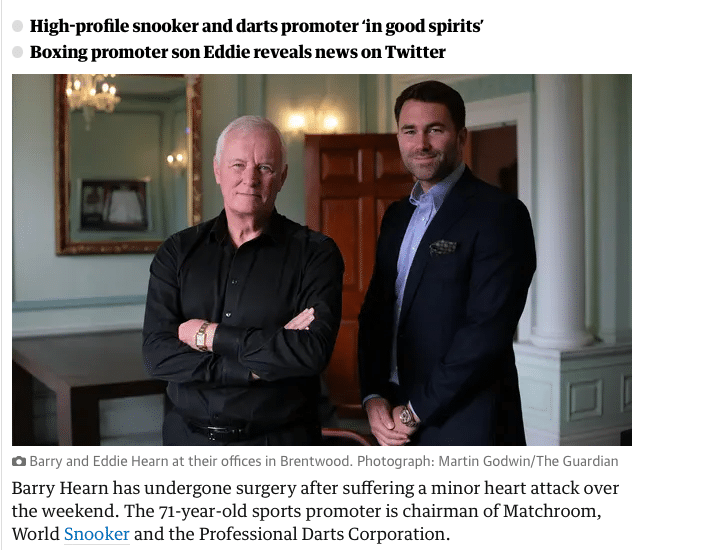
Eddie learned from Barry, and has kept some traits from dad, while making his own path.
“My mum, massively influential because they’re two completely different characters. I think she would drive an extra 10 miles to get 10 P off a packet of ham. Do you know what I mean? And he would literally just not drive and pay an extra 100 quid for a packet of ham thing. So she’s kept him, kept that sanity through his success.
I think the world has changed so much. And you look at the older generation, I look at my nan and my grandad, both out of the East End, just proper old school people with unbelievable values. And my dad always laughs at me because he might phone me up and say, ‘Where are you And I say, I’m in the supermarket just getting some food. He goes, What? In the supermarket?’
“It’s only now as he started cooking. But by that generation, it was like the woman just looks after the man and the man goes out and earns the money. They’re very simple lives. And now the world has completely changed and I think it’s a good thing. So yeah, they were pretty influential to me as well.
“But a lot of the fighters that I met have been influential to me. Not just the ones that I grew up around, but the ones that I work with. Anthony Joshua, Carl Froch, and even people in here, Tony Sims, just good people around the sport. I think in boxing, as frustrating as it is sometimes and as shit as the business can be, there’s a lot of great people in boxing. And that’s been one of the best blessings, is being around good people and sharing great times.”
Q) Fast forward to say 20, 30, 40 years, looking back on your career, how do you, Eddie Hearn, want to be remembered?
Eddie Hearn: “I don’t know. I mean, the worry is that because of the perception of who you are or what you do when you’re at the top, sometimes you never really get the credit of being a good person and loving the sport. So that’s why the work that I do in the community now, that’s not about proving to people that I’m a good person.
But I think the older I get, I want to be remembered as the greatest promoter of all time. I mean, that would be the first thing. But things like that only happen when you’re dead, when you go. I was saying to someone the other day, someone passed and I said, ‘All these amazing, wonderful things that we say about people when they pass, we never said it to them when they were here.’
“I want to be remembered for someone that gave back as well to the sport. And I think I’d like to be remembered as someone that showcased boxing within the community and how it can change people’s lives and the influential role it can play.
I’d like to change people’s minds about boxing. Parents. I sometimes go up, and if one of my daughters is playing football or whatever it is, I talk to some of the parents. And she goes to a very nice school and I say, ‘You know, you should get your little one down the boxing club’. They’re like, ‘Okay, right’.
“I don’t say it to her, I think you have no idea. And it’s not having my daughter or son punched in the head. So you don’t have to. You don’t have to spar. My daughter don’t spar spar. But she goes down there for an hour and a half and leaves absolutely soaked in sweat and just feeling really positive and confident and part of something. But it’s just that perception. And that’s why the funding is always a struggle at government level, because they just don’t know. The ones that do go down, they do help because they see it first-hand.”
Q) Absolutely. One question away from the boxing, what would you say has been your biggest achievement outside of the sport or all sport in general?
Eddie Hearn: “Obviously, we talked about becoming a father. That’s a big moment in any man or woman’s life. And that’s challenging, especially with one teenage daughter and one 10-year-old who are obsessed with the phones. I’ve actually become now… I must be boring the life out of people because I’m talking about the danger of these phones and social media and algorithms and all this information and negativity that’s infiltrating the mind of the next generation.
Don’t want to sound like Andrew Tate or Carl Froch, but I was actually talking to Froch about it on Saturday, and it’s wild that some of his conspiracy theories are, this is fact: it’s terrible what the kids are digesting now in terms of information and content. And I’m really concerned about that generation.
So I think outside of business, I think there’s a lot to do.
I probably lived quite selfish life for the last 10 or 12 years in terms of business, business and obviously family as well, but in terms of what I could be giving back. And now we’ve got 40 staff worldwide. Frank Smith’s doing more and more and taking more responsibility. If we do have capacity to do a little bit more to help.
“So I think that we’re really proud. We have something called the Matchroom Sport Charity Foundation, which we’ve donated well over a million pounds in the last couple of years to local charities or anybody that writes in, children’s hospices and stuff like that. And that’s important to us to give back as well, because obviously we’ve done very well and we’re doing very well. That’s the thing with me and my dad, we’re not lavish, really. I know it sounds a bit naff, but tomorrow I’ll jump on the train in Billericay and I’ll go up to Liverpool Street and I’ll pop on the tube over to the West End for my meetings. I don’t have a Rolls-Royce phantom sitting outside with a bloke with a hat going, ‘Good morning, Mr. Hearn, where are we going to?’
“And the same with my old man, same with him. He just wanders around with his briefcase around the tube. We don’t have planes, we don’t have yachts, we don’t have… We just save the money. We’ve done well and we’ve got enough money to be able to give back and make a difference. I think that’s a nice thing to be able to do.”
Q) You mentioned there, obviously about always being grounded yourself and your dad. Obviously, you was born into your dad who was a good businessman. Your dad wasn’t born into money. Your dad grew up a poor kid. He’s told me that himself. Do you think that’s why he is still so grounded now and doesn’t have those lavish luxury like you mentioned Rolls-Royce and a plane or whatever else?

September 13, 2022 in Las Vegas, NV, USA; Eddie Hearn, Chairman of Matchroom Sport, at Canelo “grand” arrival at the MGM Grand Hotel for third GGG fight. Hearn having AJ and Canelo in his fold made for heady days. Photo: Ed Mulholland/Matchroom.
More Eddie Hearn Q n A
Eddie Hearn: “Yeah, I’m more lavish than him, but still, for what I could be, I’m totally grounded in that respect. I think when you come from nothing like he did, you automatically have greater value for money and for things. But everything’s about levels. So I grew up in a mansion, the Matchroom HQ. So for me, that was normality. So where do you go from there? Whereas he grew up in Dagenham in a council flat and shared a room with his siblings. And he walks around now at his house.
We go for a walk and he’s got 300 acres and he’s 75 years old and he goes to me, Look at this. I can’t believe it. I can’t believe it. And I’m so jealous. And I look at him, I think, That must be the greatest feeling. It’s really the one thing. And I can’t say I was deprived of because I’ve been very lucky, but I’ll never get to feel that. I can appreciate my achievements, and I’ve done great. But I did have a leg up. No point saying that I didn’t because I did. But I played the hand like a blinder.
“But what a feeling to be able to walk around and look at what he’s got and realise that his dad was a bus driver, his mum was a cleaner. And look at what he’s achieved. It must be an unbelievable feeling.”
Q) If there’s one thing you could change about boxing, what would it be and why?
A) “I think that everybody that works in a business has to act within with common sense, and actually with a business strategy. Because the problem with the sport is, it’s full of people that either don’t know what they’re doing or don’t care what they’re doing. So it’s very difficult.
We are really the only promotional company that has had continuous profitability and a solid business foundation. Everybody else has gone skin. They’ve lost a couple of million, they’ve made a little bit, they’ve gone skint and wound up a company. They’ve gone back.
“So that’s what you’re competing with. So you’re not competing with everybody with a solid base and a business acumen that is just running the business like it should be run. You are dealing with people that come in and go, don’t care.
And all of a sudden, some investor pops up. How much is in? He’s just got 20 million of investment. So he’s going to go and give Terence Crawford six or seven million to fight David Avanesyan or whatever it is. So it really is the Wild West in that respect. And the unbelievable thing about boxing is there are no barriers to entry.
“You could meet someone tomorrow, a very wealthy individual that goes, ‘I like you, James. I think that actually you could be our guy’. Next thing, you’re a massive adviser with huge funding, or you want to become a promoter or even a fighter. And it’s like you see people pop up. I have to negotiate with you. It could be lawyers, it could be managers who know absolutely nothing about boxing.
“’I think my man’s worth a lot more than that’. Really, in what respect? He doesn’t sell a f*cking ticket.
No one tunes into watching. So how can you sit here and tell me he’s worth that much? Well, that’s the frustration that drives your man. But that’s why you’re never safe. And that’s why it’s a great leveller, the boxing business, because you can never become complacent. Because when you’ve got everybody by the bollocks, some lunatic comes in with a load of money that’s not theirs and just goes, ‘Right, come on then. Spend, spend, spend’. And you’re like, ‘What’s happening now?’
And you’ve got a situation even now.
Purses are out of control in terms of the value of the fights! Great for the fighters, good luck to them. But it just means that people go skint because the model is wrong. But you have to decide which ones do you want to compete with and which ones do you go, off you go. I’d say it’s been an interesting few months.”
You may like
-
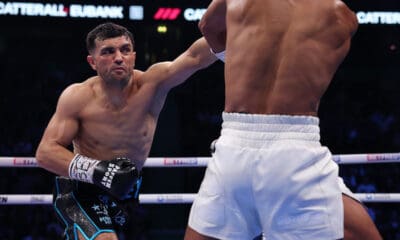

Manchester Mess: Jack Catterall Gets Win Over Harlem Eubank
-
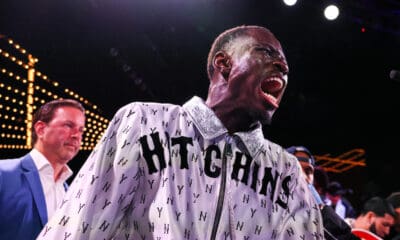

Richardson Hitchins Takes Risk For Big Reward, Stops Kambosos Jr.
-
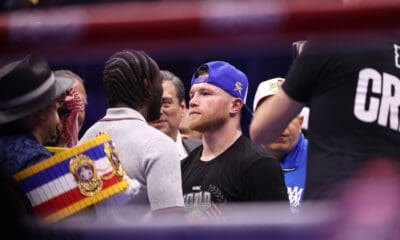

Canelo vs Crawford Confirmed for Sept. 13 on Netflix
-
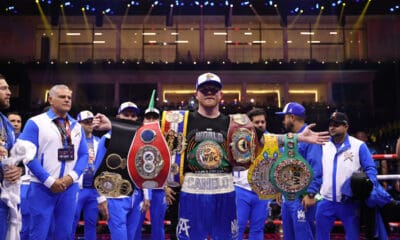

Canelo Álvarez Wins. Bring On Bud Crawford
-
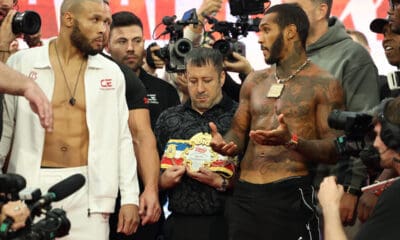

Prediction: Eubank Jr. vs Benn – A Fight for Family Legacy Saturday
-
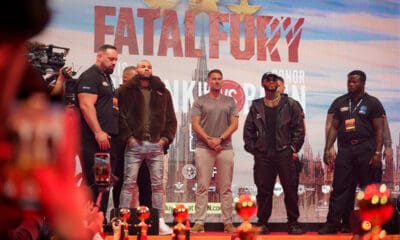

British Boxing Blood Feud Is Here: Eubank Jr. vs Benn







